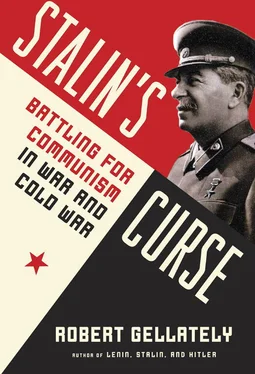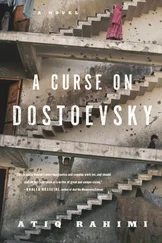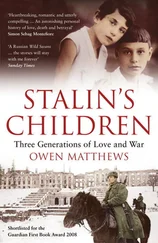This book also sets itself apart with respect to the attention paid to Soviet society in the postwar era, an area usually glossed over even in the “new Cold War history.” 33Such approaches would do well to focus more on the domestic scenes in the Red Empire. 34
As for Stalin, I show that well before the shooting stopped in 1944–45, he set out to shore up his dictatorship and to straighten out the ideological wanderings that had crept into Communist theory. It was as if he were preparing the home front for the war of ideas and political principles that he was determined to pursue against the West. The image of the man and his rule in the last years of his life that I present is strikingly different from the one offered in a recent account that, by contrast, argues that the Soviet dictator “presided over a process of postwar domestic reform.” 35
What haunted him were images from the first days after the German invaders had broken through the lines in 1941. To his dismay, they had sometimes been welcomed as liberators, not just by a handful here and there but by cities, whole regions, and entire nations. As soon as the Germans were driven out, he began settling accounts with all “enemies within” in what for untold tens of thousands became a reign of terror. Multiple cases of ethnic cleansing took place in the USSR and in its sphere of influence. The wartime conferences foresaw what they euphemistically called “population transfers,” which turned into living hell.
As the Red Army moved closer to Berlin, behind the lines another war against native resistance continued to be waged in the Baltic states, Poland, and Ukraine. The Soviet campaigns may have been about revenge seeking for real and imagined “treason,” but at the same time they were integral to the battle for Communism and part of the crusade to bring these teachings deep into Europe. This struggle has usually been ignored in studies of the Cold War.
Hunger and the associated illnesses prevailed across the Continent and extended to the Soviet Union, where after drastic shortages during the war, a full-fledged famine in 1946–47 cost well over a million “excess deaths.” 36Why has this postwar social crisis in Eastern and Western Europe either been ignored or downplayed? There are many reasons. Some scholars have coldly assessed that the pain and suffering of those times were inevitable in the process of Europe’s postwar recovery. 37The horrors of the Third Reich and Second World War might have led some to underestimate the terrors of the aftermath. Nevertheless, in the long period since that time, historians have been slow in redressing the almost casual way in which postwar atrocities were initially treated. Several recent studies have demonstrated this point beyond doubt, including one that blames the Soviet Union for perpetrating multiple genocides. 38
Finally I should point out that this book is not a biography of Stalin, even though he is the central character. The new documentation presents him as a curious figure, difficult to read, often brilliant, but ruthless and tyrannical. He was able to pursue numerous courses of action simultaneously and operated in such a fashion as to allow himself maximum flexibility. Like the warrior he imagined himself to be, he was adept at keeping everyone off guard. He could play the role of the jovial man of the people, down-to-earth and transparent, yet was practiced in keeping his thoughts and feelings closed off, even to his few close friends. What remains remarkable was his reserve toward ordinary people. Quite unlike Hitler, he did not crave their applause and indeed found their adoration repulsive, once saying to his daughter that every time “they open their mouths something stupid comes out!” It made him cringe. Mostly he communicated his commands and wishes through others. After the war, his few speeches were still poorly delivered, and as if he just did not care, whole years went by without his addressing the public at all. 39
Most visitors to the Kremlin were overwhelmed, obsequious in the presence of a man who had ordered the deaths of thousands. One of his assistants later suggested that some, on first meeting the dictator, probably felt nervous because subconsciously they were intimidated at being near such a monster. 40
For all that, Stalin impressed foreign statesmen, and most of them considered him a talented and extraordinary figure. British foreign secretary and later prime minister Anthony Eden said he would have chosen Stalin first for a team going to a conference. “He never stormed, he was seldom even irritated. By more subtle methods he got what he wanted without having seemed so obdurate.” 41
Can we possibly understand the enormity of the Communist-inspired tragedy and how it came to pass? Certainly no single individual, not even a leader more powerful than Lenin and Stalin combined, could have done it all alone. The Communist credo and its visions awakened wellsprings of enthusiasm and boundless energy and inspired untold millions of loyal followers. The original Russian revolutionaries thought they could sacrifice human rights in the short term because their goal was a future when “real freedom and justice” would prevail. They were convinced that some “external force” (including terror) was needed to enlighten their people. Once true emancipation was achieved, or so they thought, “mankind would do justice to this chiliastic dream of global revolution, and all the atrocities and crimes” that the Communists had committed “would be remembered only as passing incidents.” 42It turned out that the “final end of socialism” was always over the horizon, in a remote time and space. Still, part of what made it attractive to the true believers was that it was part of a “super-guaranteed future.” 43
Stalin was a powerful figure who identified with, symbolized, and fueled those aspirations. He and an army of Soviet standard-bearers led their own people, and then other nations, down the road to monumental failure, a man-made catastrophe that many refused to see until it imploded. 44
PART I
THE STALINIST REVOLUTION
CHAPTER 1
Making the Stalinist Revolution
Stalin was not the heir apparent when Lenin died in 1924. But within five years if not before, he was virtually the undisputed leader. A decade later he was the all-powerful dictator and creature of the Stalinist revolution, an extraordinary experiment in socialism. In his own lifetime he became a godlike figure, one to whom even the proudest comrade, wrongfully indicted by the Stalinist system, could willingly offer himself up for the cause. How was this possible? Here we will begin to put the pieces together and try to understand the emergence of Stalin, who became the Leader, Boss, or Master of the Kremlin.
Lenin’s leadership was marked by bouts of illness, overwork, and strain, and from mid-1921 his health rapidly deteriorated, with a series of strokes beginning the following year. The question of who would take his place was uppermost in everyone’s mind. Lenin was not exactly helpful in his political “testament”—two short notes he dictated to his secretary in December 1922. In those last words to his comrades, he worried about a “split” in the party and had negative things to say about all the leadership contenders. In a postscript dictated just over a week later (January 4, 1923), he said that Stalin was “too rude” and expressed the view that someone else might make a better general secretary. 1
However, it would be a mistake to believe that Lenin wanted to exclude a bad choice for party leader and that, had he managed to get rid of Stalin, the Soviet Union would have been saved from a monster. In fact, until nearly the end, he trusted Stalin more than anyone and never mentioned removing him from the powerful Politburo or Central Committee. Stalin’s “offense” was to slight Lenin’s wife, Nadezhda Krupskaya, for not following doctors’ orders to stop her sick husband from dictating work.
Читать дальше











